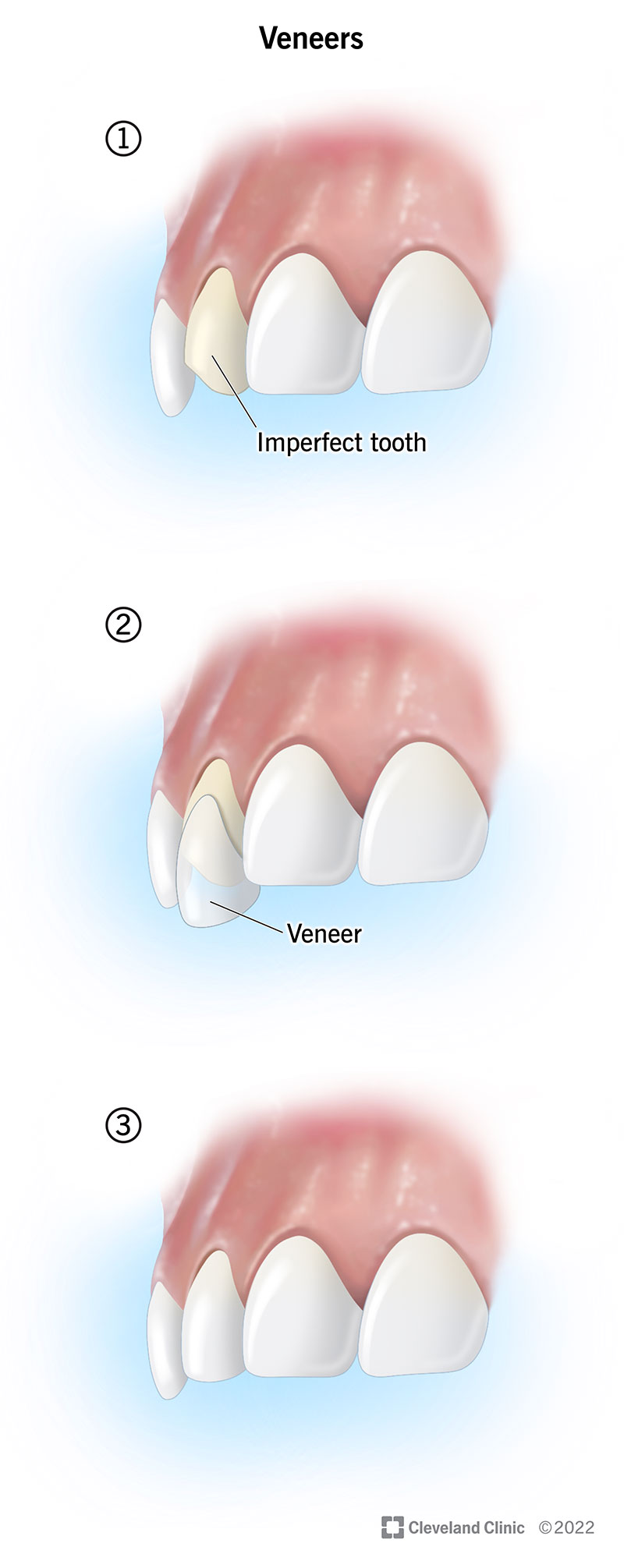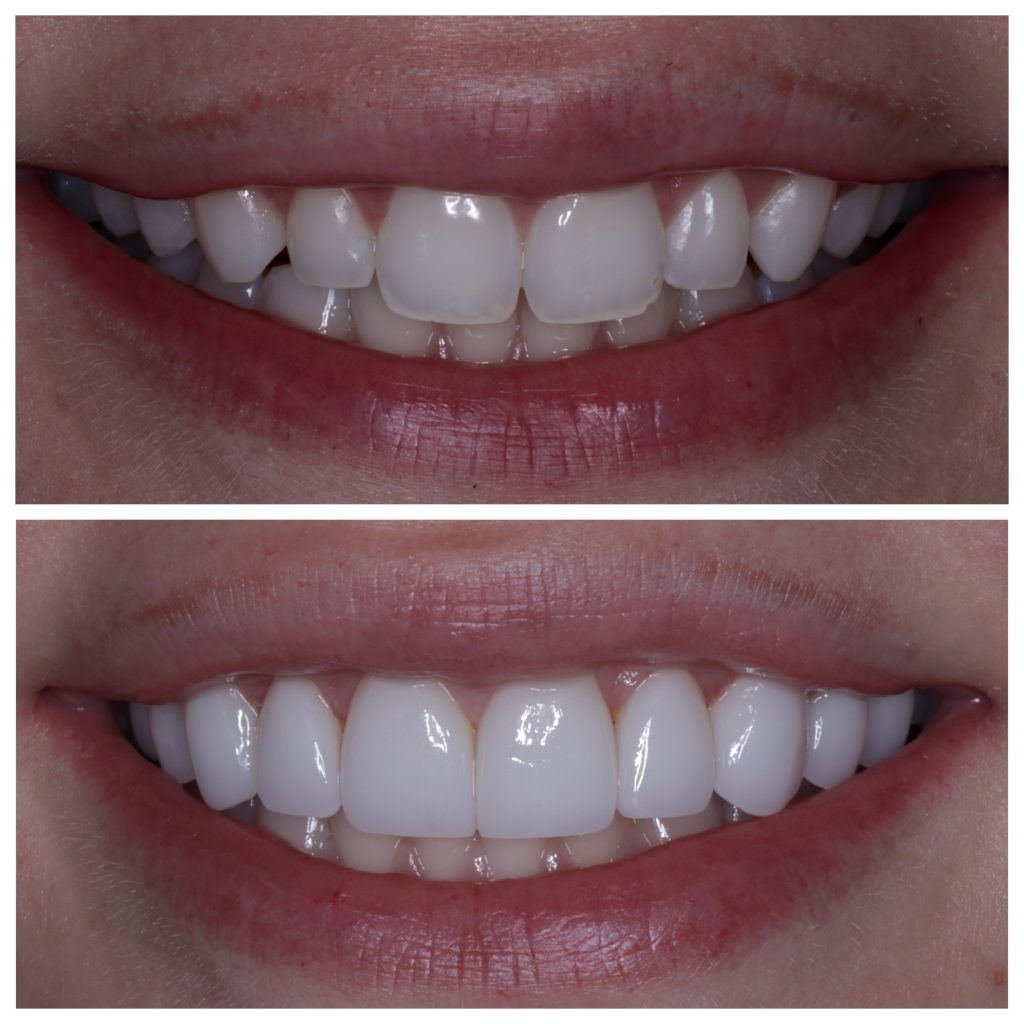Porcelain Veneers Dentist Explains the Complete Procedure
Opening the Keys of Veneers: Facts, Types, and Advantages for a Stunning Smile
Veneers provide an engaging remedy for those seeking to improve their smiles. These dental enhancements can deal with numerous blemishes, from discoloration to misalignment. With choices like porcelain and composite, individuals can pick based on their choices and requirements. Comprehending the subtleties of veneers, consisting of application and treatment, is vital. What elements should one think about before deciding? The solutions might surprise those interested in this visual oral alternative.

Recognizing Veneers: What Are They?
Veneers are slim, customized coverings made to cover the front surface of teeth, enhancing their appearance. Normally crafted from long lasting products, these shells are customized to fit each person's teeth precisely. They offer multiple objectives, including remedying aesthetic flaws such as staining, chips, or gaps. The application procedure involves a dental professional preparing the teeth, typically by eliminating a tiny quantity of enamel to ensure a snug fit. When prepared, the veneers are bonded to the teeth utilizing a solid adhesive.
Clients often choose veneers for their capability to produce a natural-looking smile while providing a long-lasting service to oral imperfections. Unlike various other aesthetic dentistry choices, veneers call for marginal invasive procedures, making them a preferred choice. The result is an improved smile that can considerably improve a person's self-confidence and self-confidence. In general, veneers provide an efficient approach to attaining an extra harmonious and appealing oral appearance.
Kinds of Veneers: Porcelain vs. Compound
When considering cosmetic dental choices, 2 primary sorts of veneers stand out: porcelain and compound. Porcelain veneers are crafted from a sturdy ceramic material that imitates the natural look of teeth. They are recognized for their stain resistance and capacity to mirror light in a similar way to all-natural enamel, giving an aesthetic charm that lots of patients desire. The application process typically entails more preparation of the tooth framework and may require numerous visits to the dental expert.
On the other hand, composite veneers are made from a tooth-colored resin that is directly related to the teeth. This type permits quicker application and can commonly be finished in a single check out. While they are more economical than porcelain veneers, they may not offer the same long life or resistance to staining. Ultimately, the choice between porcelain and composite veneers depends upon individual choices, budget, and particular dental requirements.
The Benefits of Picking Veneers
Selecting veneers provides numerous benefits that can considerably boost both the visual appeals and performance of a person's smile. Among the primary benefits is their capability to deal with blemishes such as discoloration, voids, and imbalance, causing a more consistent look. Veneers can additionally enhance the resilience of teeth, providing a safety layer that guards them from damage.
Moreover, they need marginal tooth preparation contrasted to other dental procedures, protecting even more of the natural tooth framework. This conservation contributes to a much healthier dental atmosphere while still accomplishing a stunning smile.
Veneers are highly adjustable, allowing individuals to choose the form, size, and color that best suits their preferences. Additionally, they are stain-resistant, making it easier to keep a eye-catching and intense smile gradually. Generally, veneers offer a reliable option for those seeking both cosmetic improvement and long-term dental health and wellness benefits.
The Veneer Application Refine
The veneer application procedure involves several vital actions to guarantee ideal outcomes. A consultation is performed to analyze the patient's needs, adhered to by the preparation and shaping of the teeth. The veneers are adhered in area, with modifications made for an excellent fit and look.
First Consultation Steps
An extensive preliminary consultation is essential for anyone considering veneers, as it sets the foundation for a successful treatment. During this meeting, the oral specialist evaluates the individual's dental health, going over any existing concerns that could affect the veneer application. This assessment may include X-rays and a visual assessment to establish the problem of the teeth and gum tissues.
The dentist also involves the patient in an in-depth conversation concerning their aesthetic goals, preferences, and expectations. They may offer numerous veneer options customized to the client's specific demands. In addition, the expert describes the treatment, potential threats, and aftercare demands, guaranteeing that the individual is comfy and knowledgeable before waging the therapy.
Preparation and Shaping Teeth
After the first consultation, the next phase includes the prep work and shaping of the teeth to accommodate the veneers. This vital action is carried out by the dentist, that carefully examines the tooth structure to establish the quantity of enamel that requires to be eliminated. Normally, a thin layer, normally around 0.5 millimeters, is shaved off to assure an appropriate fit for the veneers. Precision is critical throughout this process, Continued as it influences both the general convenience and the visual result. Once the teeth are effectively shaped, perceptions are required to create customized veneers that align perfectly with the person's dental profile. This thorough preparation sets the phase for an effective veneer application, improving both look and feature.
Bonding and Final Changes
Adhering to the shaping and prep work of the teeth, the bonding procedure starts, noting an important phase in the veneer application. During this phase, a dental adhesive is related to the prepared tooth surface area, assuring a strong bond between the tooth and the veneer. The dental practitioner meticulously positions the veneer, making changes to attain the wanted alignment and aesthetic appeals. When effectively put, an unique light is used to treat the sticky, solidifying the bond. After healing, the dentist conducts final changes, trimming any excess product and improving the veneer's shape to assure a natural appearance. This mindful interest to detail enhances both feature and visual appeals, adding to a general attractive smile that is long-lasting and durable.
Caring for Your Veneers: Upkeep Tips
Caring for veneers is necessary to preserve their appearance and durability. A constant daily cleansing routine, conscious avoidance of discoloring foods, and normal oral examinations are vital components of reliable upkeep. These practices assist ensure that veneers stay in peak problem and continue to improve one's smile.
Daily Cleaning Regimen
Frequently preserving veneers is crucial for their longevity and appearance. A correct daily cleansing regimen can assist maintain their luster and avoid damages. Dental practitioners advise cleaning two times a day with a soft-bristled tooth brush and fluoride tooth paste, making certain that all surfaces are cleansed delicately to prevent damaging the veneer surface area. Flossing everyday is additionally vital to get rid of food fragments and plaque from between teeth, where brushes may not reach. In addition, making use of an antimicrobial mouth wash can help keep dental hygiene without harming the veneers. It is suggested to prevent rough cleansers and devices that can damage the veneer. By complying with these basic steps, people can maintain their veneers looking beautiful while advertising general dental health and wellness.
Staying Clear Of Staining Foods
Veneers are made to boost the look of teeth, their sensitivity to tarnishing necessitates cautious nutritional options. It is essential for individuals with veneers to be conscious of specific foods and beverages that can result in staining. Dark-colored items such as coffee, merlot, and berry juices should be consumed in moderation, as they are recognized to stain both all-natural teeth and veneers. Furthermore, acidic foods like citrus fruits container damage the bonding agents utilized in veneers, making them a view it now lot more vulnerable to discoloration. To maintain an intense smile, it is a good idea to wash the mouth with water after taking in staining foods and to practice regular oral hygiene. These thoughtful selections contribute substantially to the longevity and aesthetics of veneers.

Normal Dental Exams

Preserving the integrity of veneers calls for a dedication to routine oral exams, as these appointments play a crucial role in guaranteeing their longevity and appearance. Throughout these visits, oral specialists can assess the problem of the veneers, inspecting for any indicators of wear, damage, or underlying dental problems. Additionally, routine cleansings help remove plaque and tartar that can collect around the veneers, promoting total dental health and wellness. Dental experts can additionally offer individualized suggestions on treatment strategies and products matched for veneer maintenance. By adhering to a routine of exams, individuals can deal with potential issues early, ensuring their smile remains attractive and vivid. Inevitably, regular oral visits are an important component of veneer care.
Is Veneers the Right Alternative for You?
Choosing whether veneers are the right option typically rests on private visual objectives and dental demands. For those looking for to resolve issues such as staining, chips, or misalignment, veneers can provide a transformative solution. Candidates commonly consist of people with healthy teeth but desire a boosted smile.
However, it is essential to take into consideration variables such as tooth enamel condition, the level of dental issues, and the willingness to preserve veneers - Dental Veneers. Consulting with an oral specialist is important, as they can examine dental health and wellness and establish if veneers appropriate
Additionally, prospective prospects need to show on the lasting commitment, as veneers may need replacement every 10-15 years. Expense factors to consider additionally play a significant duty, as veneers can be a substantial financial investment. Eventually, the choice needs to be well-informed, stabilizing visual wishes with sensible considerations for enduring results.
Regularly Asked Inquiries
The Length Of Time Do Veneers Usually Last Prior To Requiring Replacement?
Veneers normally last in between 10 to 15 years prior to requiring replacement. Factors such as oral hygiene, lifestyle selections, and material high quality can influence their durability, making routine oral check-ups important for preserving their condition.
Are Veneers Safe for Individuals With Sensitive Teeth?
Veneers can be secure for people with description sensitive teeth, yet it typically depends on the extent of sensitivity and the dental expert's method. Consulting a dental expert prior to continuing is vital to ensure perfect results.
Can Veneers Be Removed or Changed Easily?

Do Veneers Stain With Time, and Exactly How Can I Avoid It?
Veneers can discolor in time, specifically from foods and beverages like coffee or merlot. To avoid staining, maintaining good dental health, making use of a straw for beverages, and normal oral cleansings are suggested methods.
What Is the Expense Array for Obtaining Veneers?
The expense of veneers typically varies from $500 to $2,500 per tooth, relying on variables such as product type, dental practitioner experience, and location. Patients need to talk to oral specialists for personalized quotes and financing options.
As soon as the teeth are effectively formed, impressions are taken to produce custom veneers that straighten completely with the client's dental profile. During this phase, a dental adhesive is used to the prepared tooth surface, guaranteeing a solid bond in between the tooth and the veneer. It is crucial to take right into account factors such as tooth enamel condition, the level of dental concerns, and the determination to keep veneers. Veneers can be safe for individuals with sensitive teeth, but it frequently depends on the severity of level of sensitivity and the dentist's method. The expense of veneers usually ranges from $500 to $2,500 per tooth, depending on aspects such as material type, dental expert experience, and place.